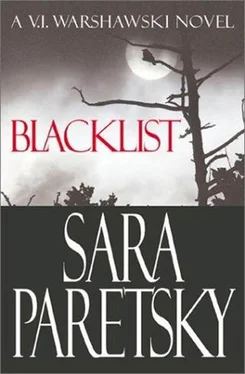In front of the house, the drive split in three, one fork leading to the garage, one to the other outbuildings, and the third along the left side of the house itself, where a discreet sign pointed to a tradesman’s entrance. The main entrance, where I pulled up, faced south; shallow steps led to a porticoed doorway.
I could hear voices from around the north side of the mansion, so I climbed out of the Mustang and followed the sign to the tradesman’s entrance. A van and a small truck were parked there. Three men were unloading supplies while a woman in blue jeans and a black turtleneck and blazer supervised.
In the near distance, someone was doing something with hay and a wagon. How bucolic. Almost justifying calling this spread “rural Illinois,” as Calvin Bayard had done in the testimony I’d watched last night. Out in his overalls at four in the morning like all the other Illinois farm boys who had forty-room palaces to protect from weasels.
“That’ll see you through the weekend, Ruth.” One of the men laughed loudly and handed a clipboard to the woman.
The woman in black signed, frowning at his familiarity, but he laughed again, clapping her on the shoulder, telling her he’d be back first thing Monday. He slammed the back panels of the van shut and jumped into the driver’s seat, whistling “Danny Boy” in a cheerful tuneless way. The back panels proclaimed “Home Body-For All Your Home Care Needs” in green cursive.
The other two men were unloading groceries from the truck. Ruth checked each item before letting it into the house.
“Miss Catherine doesn’t like this brand of yogurt. Why didn’t you bring the Bulgarian? And we specified teriyaki tofu; she won’t touch the Hawaiian.” This was the woman who’d answered the phone when I called pretending to be one of Calvin Bayard’s old interns; I hoped I’d been so much hoarser yesterday that she wouldn’t recognize my voice today.
The man explained that the Bulgarian yogurt was past its shelf date. Ruth told him sharply to bring some when he came back on Friday, even i? he had to go into Chicago for it.
If I’d thought about it, I would have guessed Catherine Bayard would be a vegetarian. She was rich; she could be a picky vegetarian.
Ruth scowled in my direction and told me she’d be with me in a minute. “You’re not with the media, are you? If you are, you’d better leave now: we have nothing to say to you.”
The media. People always say this as if it were some foul disease: you’re not with the cholera pouring out of the sewer, are you? And yet we worship and bow down before the television’s eye. I meekly denied connection to the sewage.
Ruth finished her work with the men, telling them they could have coffee in the kitchen, before turning back to me. “Yes?”
Trying to pitch my voice higher to disguise it from yesterday’s croak, I explained that I was a detective investigating Marcus Whitby’s death. “You know that Mr. Whitby died in the Larchmont pond Sunday night.”
“I watch the news, yes, I saw that story, that he had come out here to end his life, and I fail to see why that means you can bother us.”
“Oh, that’s a story Sheriff Salvi put out to calm down the community” I said carelessly. “We know better than that. 1 can step you through the evidence that shows Mr. Whitby didn’t go into that pond on his own, but you’re probably more interested in his connection to the Bayard family.”
She frowned more deeply but didn’t say anything.
“We know Mr. Whitby came out here to see Mr. Bayard, because-” “That is a lie. Mr. Bayard has seen no one this week.”
“Because Mr. Whitby was writing about one of Mr. Bayard’s authors,” I continued as if she hadn’t spoken. “Kylie Ballantine, who had such a difficult time in the fifties and sixties. Perhaps Mr. Bayard didn’t talk to Mr. Whitby, but he did come out here, didn’t he?”
She paused, as if deciding what she could reveal, then said, “The man telephoned, but we don’t allow journalists to talk to Mr. Bayard.”
“So you sent him to Ms. Renee Bayard in Chicago, but she wasn’t helpful and he came out here hoping to gate-crash.”
I held up a hand to forestall a further objection. “We know Catherine was at Larchmont both Sunday and Monday nights. She told me her grandfather-“
“You are full of lies,” Ruth said scornfully. “Catherine was in the city Monday night, as she always is during the school year. And she certainly had no reason to be at Larchmont either of those nights.”
“I talked to Catherine yesterday afternoon. She was certainly out here Monday night. We can call her.” I looked at my watch. “School’s out for the day. Unless she has lacrosse practice, she’s probably with her friends, either at Banks Street or the coffee shop they go to-Grounds for Delight, it’s called. I don’t have her cell phone number, but you probably do.”
It was a bit of a gamble-I had no idea what Catherine would say if the housekeeper called my bluff-so I only paused briefly before adding, “I’ll be honest with you: Catherine would not tell me what she was doing at Larchmont. But she says that when her grandfather can’t sleep, he goes over there, that he has a key, and she sometimes goes with him-they like the privacy at Larchmont Hall.”
“A key to someone else’s house? I never heard such a ridiculous suggestion.” She sounded fierce, but her eyes were moving uneasily between me and the house.
I pulled out my cell phone. “I agree it sounds ridiculous, but that’s what Catherine told me. Let’s call her to check on that. All I really want to know was if Mr. Bayard did go to Larchmont, if he did see Mr. Whitby. I’m trying to find the person who last saw him alive.”
Ruth looked again from me to the house. Hers wasn’t really an indecisive nature: after a moment’s further hesitation, she ordered me to come with her. I followed her through the side door to an areaway where people left coats and muddy boots. Beyond that, another door opened onto the kitchen, where the two deliverymen were drinking coffee and laughing with someone out of my field of sight. On our right, I could see the food cartons stacked in a pantry.
Ruth whisked me past a back staircase, whose narrow pine steps presaged perilous journeys for anyone carrying laundry or logs or whatever had to be hauled up and down. We passed through a swinging door into the body of the house, where the hall immediately widened. Something dark and highly polished, with thick blue runners down the middle, replaced the pine flooring. Our feet whispered in the blue pile.
Ruth moved so fast that I almost had to trot to keep up with her, so I got only a blurry sense of a dining room with a vast table loaded with silver, followed by a series of doors to smaller rooms, and pale walls hung with art of the kind people like me see only in museums.
When we reached the east end of the hall, Ruth opened the door into a small anteroom and commanded me to remain there. She continued down a right turn in the hall, heading to the front of the house.
The little room was primly furnished, with a couple of hard chairs standing in front of an empty grate. Mullioned windows gave a view of the back of the property. A series of gardens stair-stepped down to a small stream, beyond which lay New Solway’s communal wood. I stared out the window at the bare trees.
A couple of deer stepped out of the woods into the gardens. A Border collie raced out to drive them back into the woods. A man appeared, whistling the collie to his side. The two disappeared toward the outbuildings.
With the live figures gone from the landscape, I turned away, looking for something to read or do as the minutes ticked past. The room held that sense of despair you feel in any waiting area. No one worked or lived here, they only waited for someone to make decisions about them. Like at the doctor.
Читать дальше












